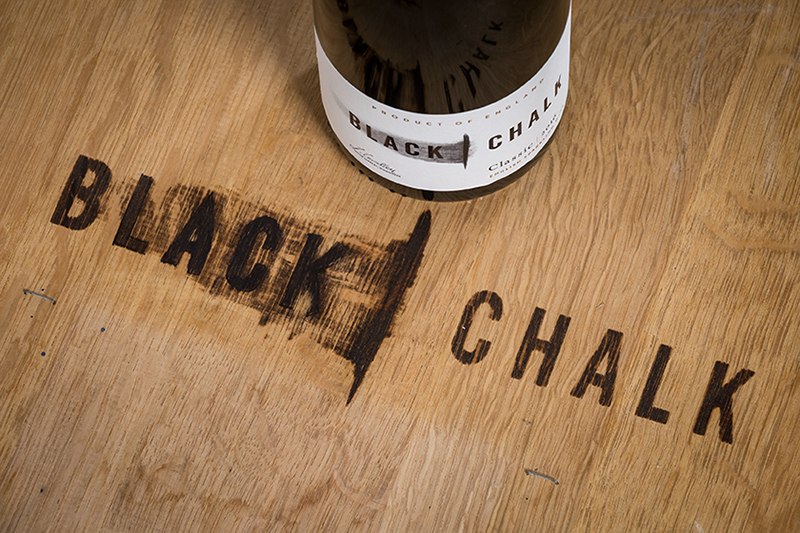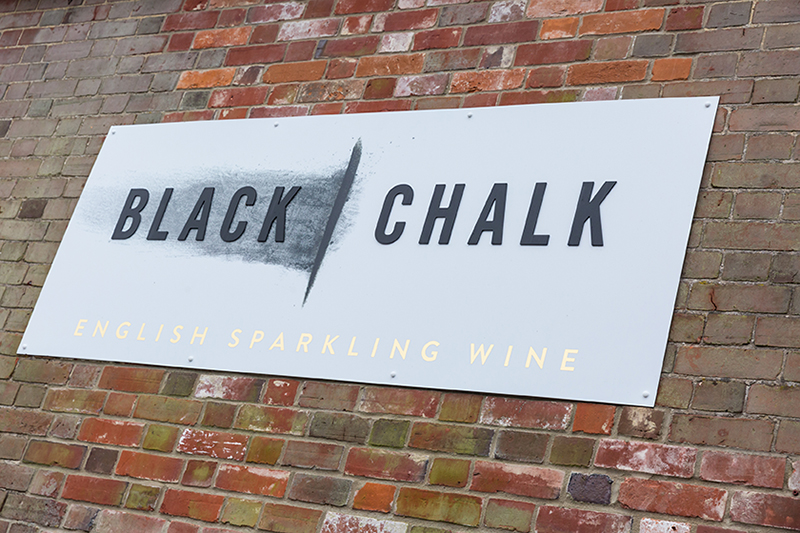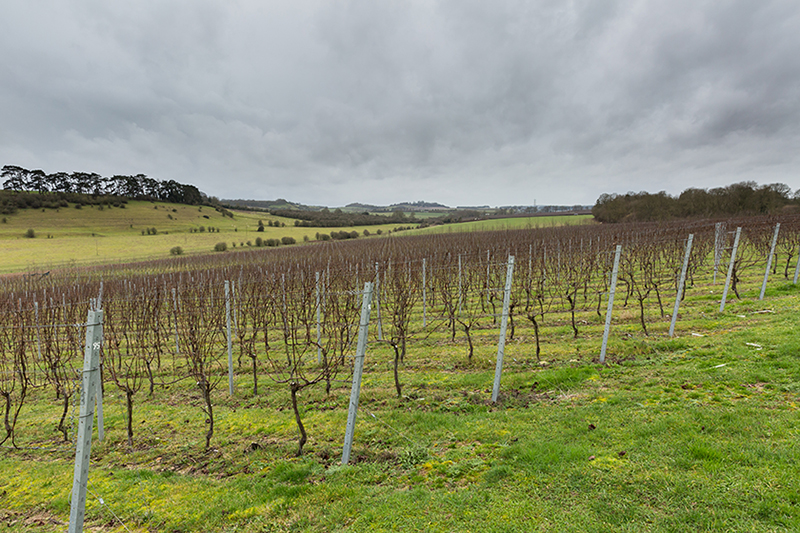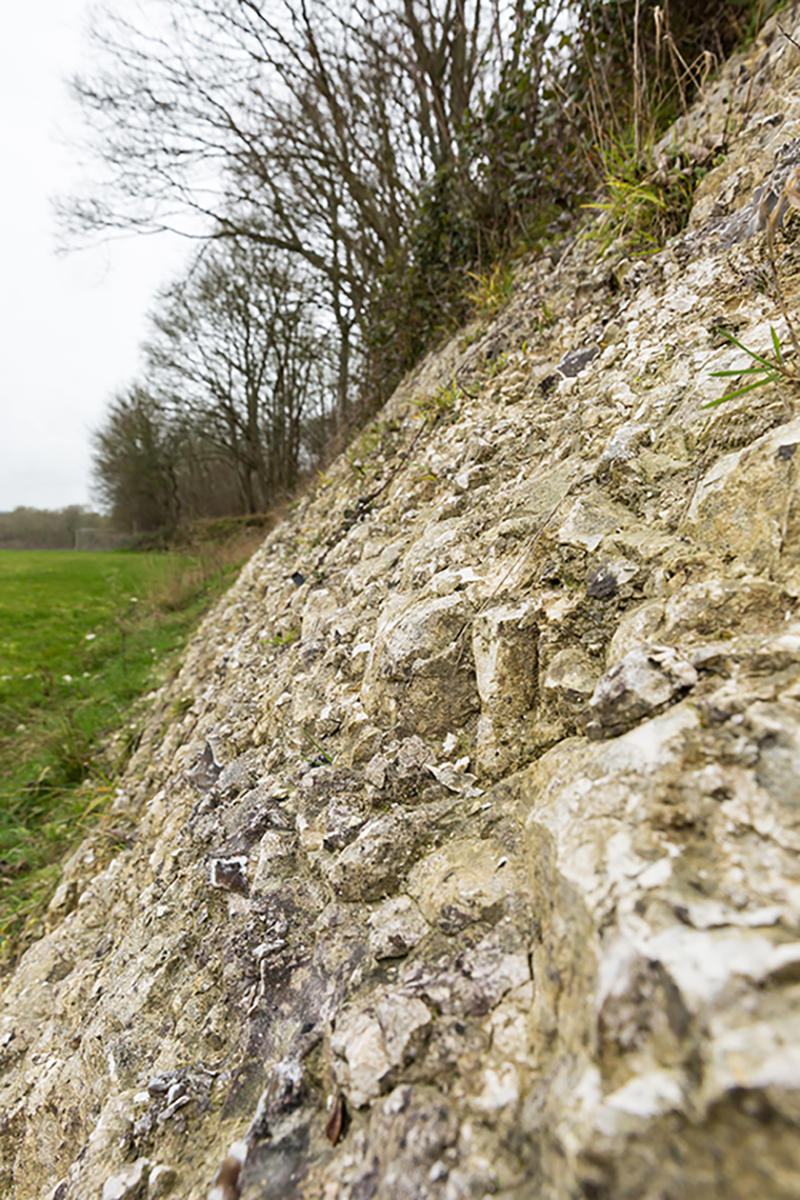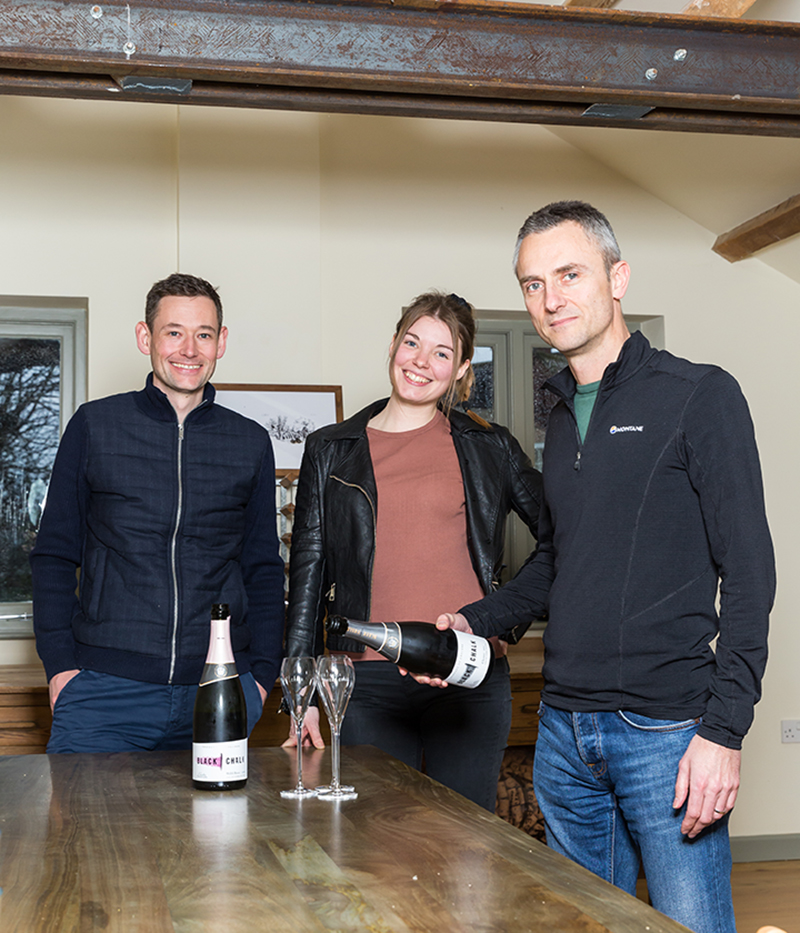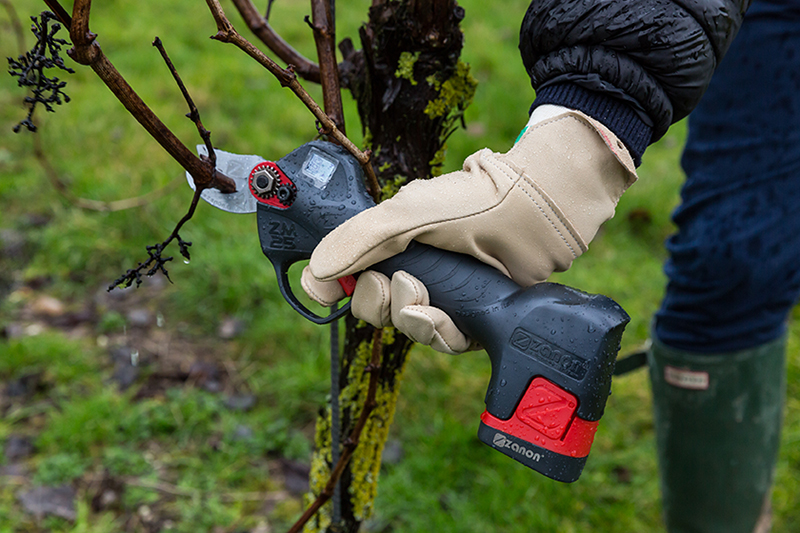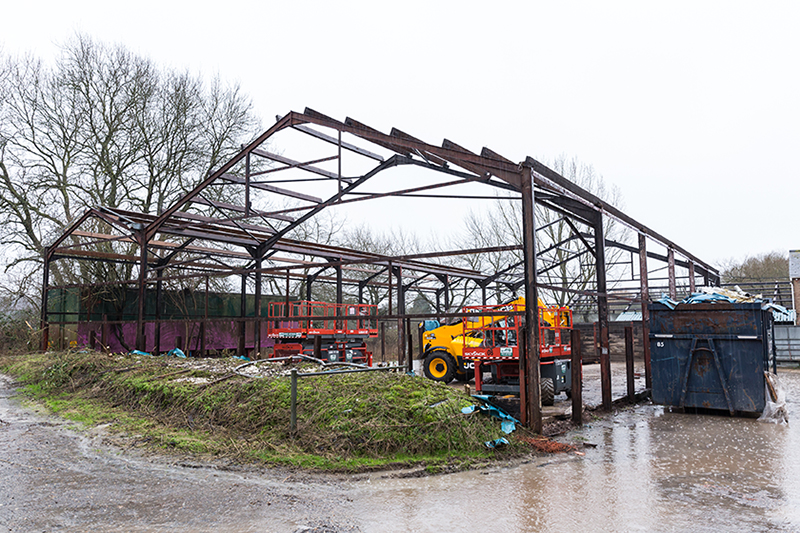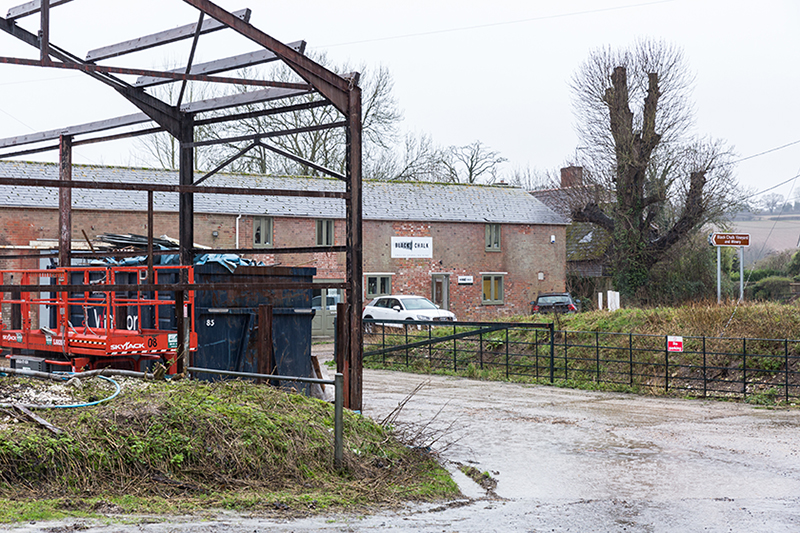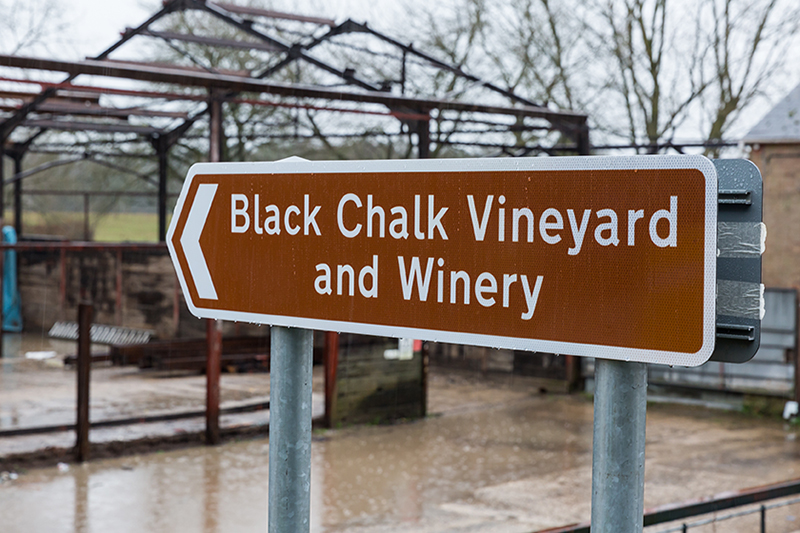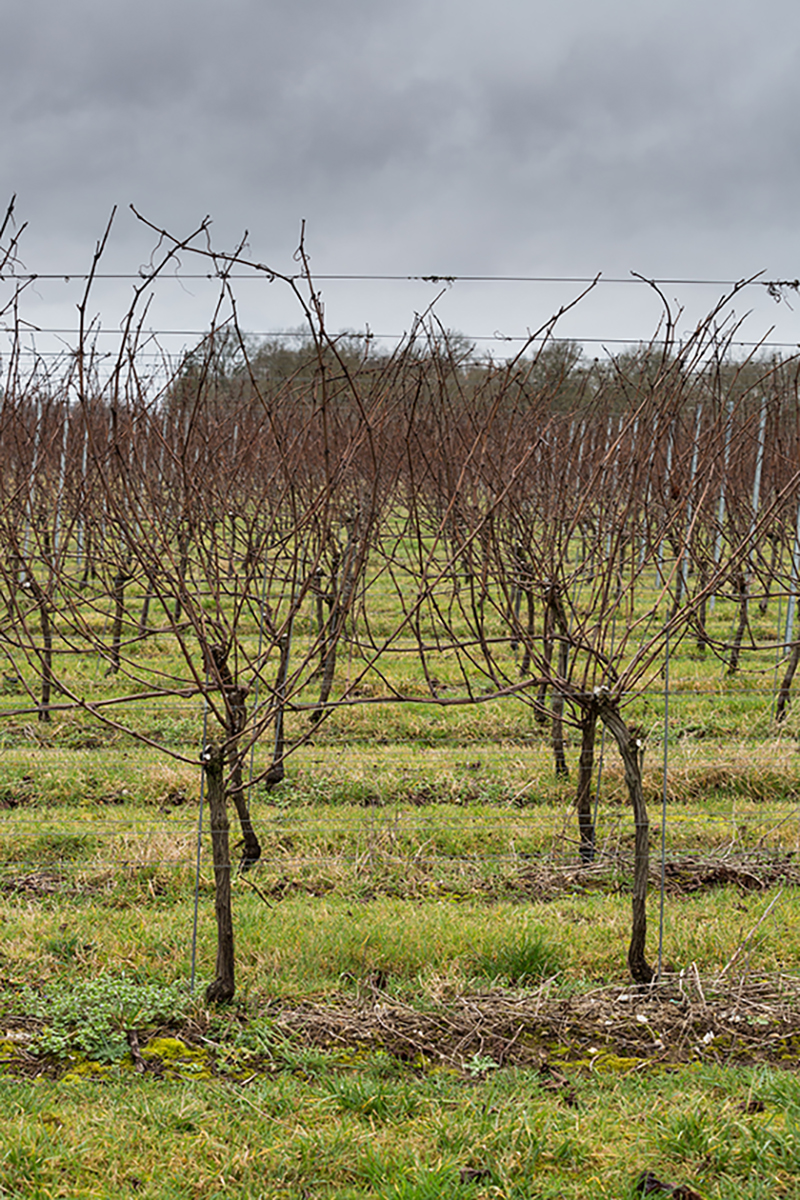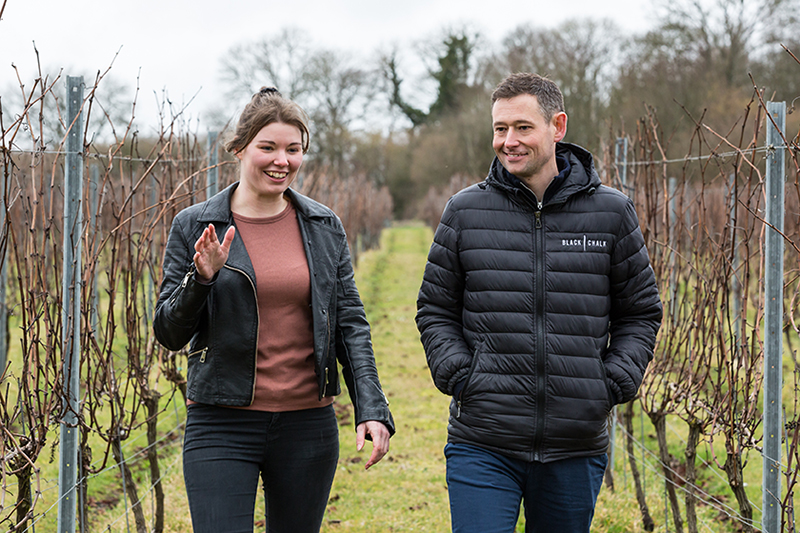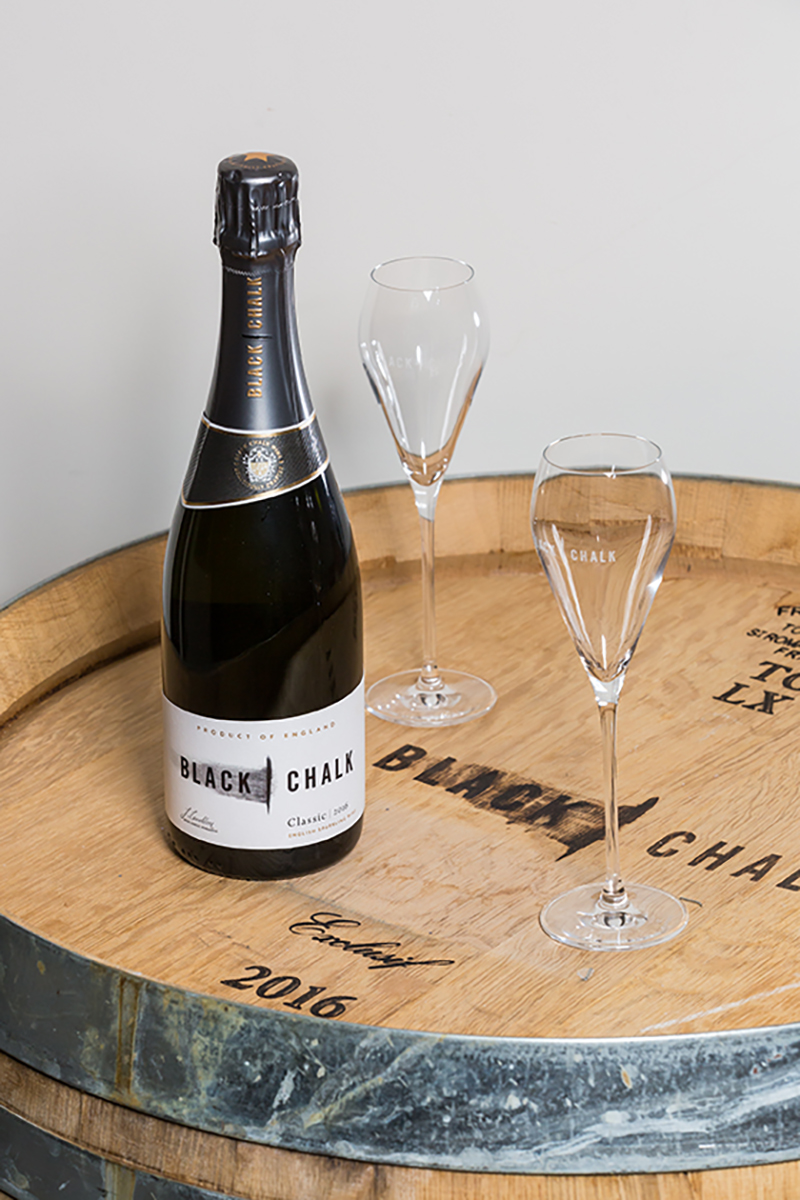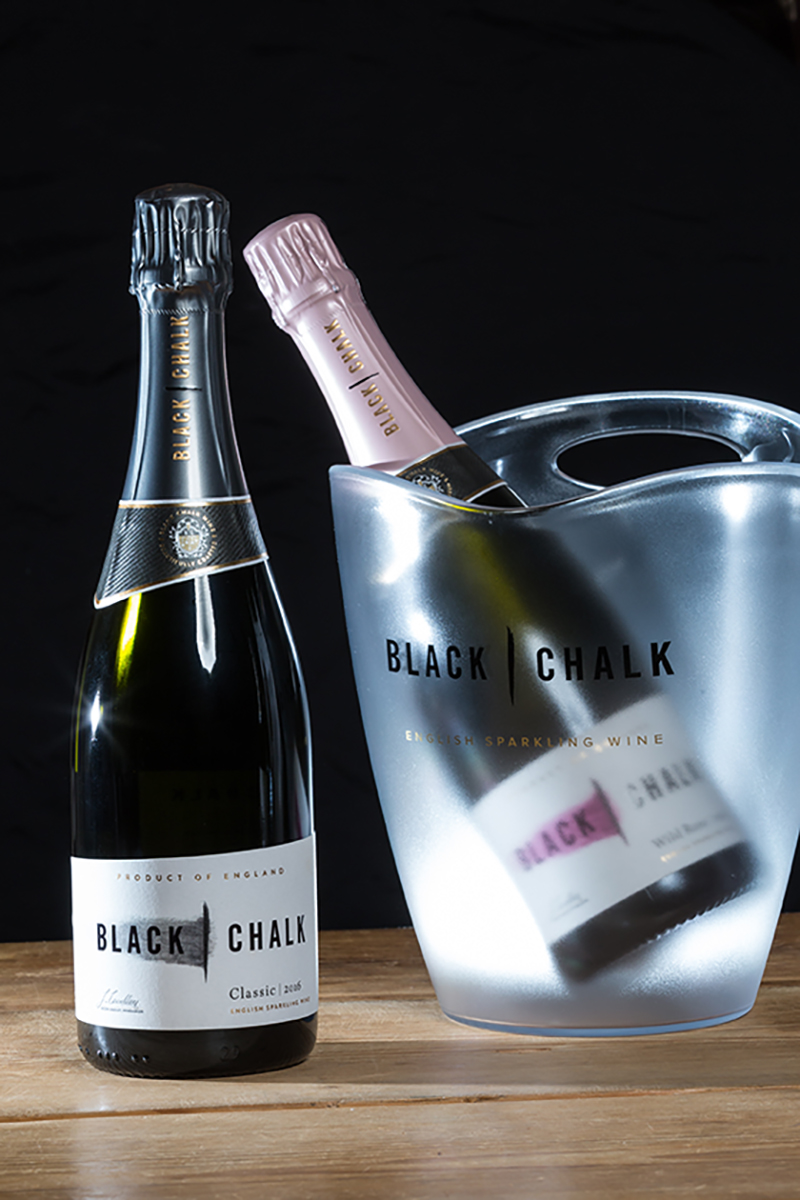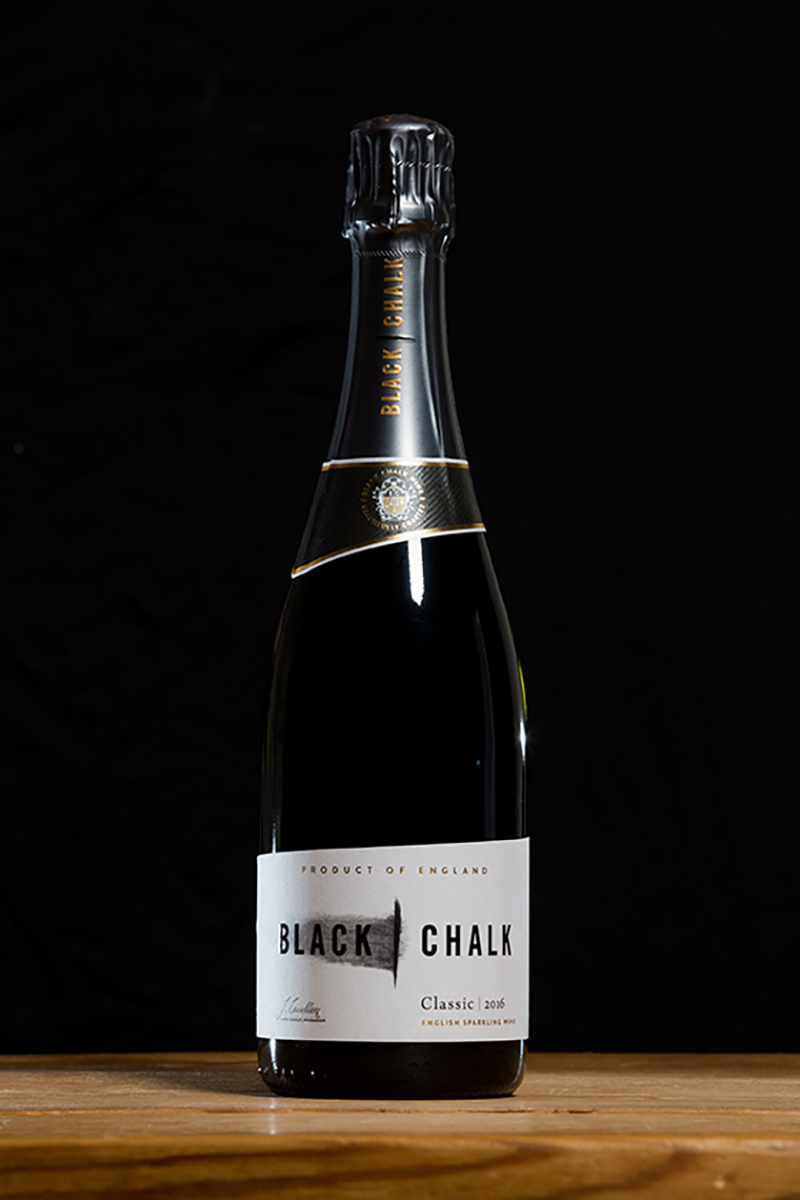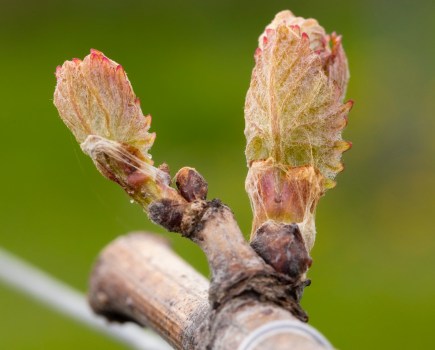A new chapter for English sparkling wine.
As the English and Welsh wine industry develops, all winemakers look for ways in which they can push the boundaries of what makes our island stand out on a world stage.
Seeking to look beyond simple fruit yield and ripeness expectations, Black Chalk’s founder and winemaker Jacob Leadley is now embarking on the next stage of his family’s ambitious project in Hampshire’s Test Valley.
As the proud custodians of four well-established vineyards located on the Fullerton Estate, near Stockbridge, Black Chalk, which was initially developed while Jacob was working at Hattingley Valley, will be able to explore the individual potential of specific clones needed to take English sparkling wine production to new creative heights.
“Speak to any viticulturist and they will tell you they grow their fruit with purpose,” said Jacob. “But this is a young industry, filled with people who are still getting to grips with which sites work well. Many vineyards are only just coming online, beginning to show their true potential, and a lot of people seem to be focused simply on growing a quality crop. Too few have a real plan in place for the fruit from pruning all the way through to winemaking and that is exactly what we will be trying to do here.”
With access to over 15 clones of Pinot noir, Pinot meunier, Chardonnay, Pinot gris and Pinot noir précoce, planted across 30-acres on four different sites, Jacob and the small, dedicated team at Black Chalk will be experimenting and “drilling down” on what really is the best way to make expressional English wine.
“The vineyards already have a very good track record and we are now in a position to look at different management techniques,” said Jacob, who has worked with the estate’s fruit, previously under the Cottonworth brand, since the first harvest. “The fruit coming from these vineyards has always been a notch above anything else and the wines made have gone on to win many gold medals. There are so many options but we will just be looking to manage yields initially. This will play into how we work with some of the individual sites and will allow us to tweak quality levels and create some special project wines.”
Wonderfully pure
Looking out across the Hide vineyard, which is aptly named being hidden away in a well-sheltered basin, Jacob points out the “raft” of different clones and exciting blocks of vines.
“We already have our eyes on certain parcels, for instance the 777 Chardonnay on Fercal is wonderfully pure and absolutely fabulous,” said Jacob. “Some of the clonal blocks may only be 10 rows or so but we are already starting to hone down on the characters and can look at how we bring together clones from the different sites in the winery too. At the moment, we are already planning to produce a single vineyard wine from the Hide because it is the one which shouts out the most. It is beautiful, it has an amazing aspect, really shallow chalk and the way it is protected allows for the heat to really accumulate. If the sun is out, even on a winter’s day, you can stand in the Hide and feel the difference in temperature. It was planted in 2011 and has always produced really good fruit from the first harvest.”
While Jacob predicts that there will inevitably be some “weaker clones”, which will be used for blending, the Black Chalk project aim to find what is working really well rather than aiming for big volumes.
“Someone had the foresight to plant the vineyards in this way and that gives us the ability to treat each clone in a particular way, pick them in order, press them in lots and treat them differently in the winery,” said Jacob. “Working as a contract winemaker it was difficult to think about which clones might be working particularly well for the UK. Often we wouldn’t know which clones were planted or a producer might have four clones but would just bring it in all together because of the size of the vineyard.”
Impressive credentials
The Hide undoubtedly has the visual wow factor, but Jacob admits that it is not without its challenges and frost can be notoriously tricky to manage here. The other sites include the Rivers, which is the oldest vineyard planted around 2007, followed by the Levels, which was established in 2008, and the Circle, a small vineyard planted in a novel oval formation.
Despite having already crafted several iconic vintages of the Black Chalk Classic and Wild Rose (tasting notes of which can be found in the Vineyards of Hampshire review on page 14) with fruit sourced from fellow producers in Hampshire, Jacob will no longer be buying in fruit.
“In my opinion, anyone focused on quality has to control the whole process,” said Jacob. “There are not many contract growers who would allow you to trial reducing crop level in the vineyard, on just one of their clones, to see how it might work. Having our own vineyards was a 10-year goal for Black Chalk and we were probably looking at having to plant our own vines. There are not that many vineyards which come up for lease, especially not ones with such a good track record. These wines which have been made from fruit solely from these vineyards have hugely impressive credentials.”
When it came to finding the right site, Jacob always had his sights set on Hampshire, believing that the region’s fruit, mostly grown on chalk, benefits from a unique, pure style.
“I know people talk about chalk far too much but it really is all about the chalk,” said Jacob. “It makes a massive difference and so it was all about Hampshire for me. When this opportunity came up, with the space for the winery, the vineyard barn, the cellar door, the space for a bar and outdoor events, it was a massive bonus.”
To help Black Chalk realise its creative viticultural aims, the team is now on the hunt for a vineyard manager. As well as looking for someone with the right experience and approach, Jacob is keen to find someone who will fit in well with the tight-knit team.
“It is all very well us all talking about what we want to achieve, but we need someone with a lot of experience to sit down and discuss exactly what is possible,” said Jacob. “We all have some knowledge, having studied at Plumpton, and we are not naïve, but none of us have been in a vineyard role for a very long time. We are not rushing the recruitment process and are holding out for the right person who is willing to take a step up, who isn’t already set in their ways but has a good idea of how they want to do things.”
Carte blanche
Alongside the overriding ethos that the industry is just scratching the surface when it comes to looking at clones, Jacob also has a keen eye for talent and is willing to nurture up-and-coming talent, giving those who want to make a name for themselves greater freedom.
“Everyone at Black Chalk has the chance to be involved from the floor up,” said Jacob. “Being part of the team is a whole experience; everything from the growing of the fruit, to creating the final product and then standing in front of consumers and telling them about it is really important. By keeping the team small, the people who want to be part of this can gain a real sense of satisfaction; there are few wineries in this country where you would get that experience.”
With this in mind, it is no surprise that Black Chalk has recently appointed Zoë Driver to the newly created position of assistant winemaker.
“For me this is a dream job,” said Zoë, who started her career in 2016 as an apprentice winemaker at Hattingley Valley, where she worked alongside Jacob. “There certainly aren’t many people of my age who get the opportunity to help shape something from the ground up and to build a framework for what could be really successful. I will get the chance to grow, learn and develop alongside the actual project itself, so I feel very lucky.”
As well as being able to get involved in the vineyard, Zoë will also be given carte blanche to focus on specific parcels of fruit, to be creative and develop some experimental wines under the Black Chalk umbrella.
“Nothing is set in stone yet, but it is very exciting to be given the chance to be creative and to have a bit of free rein to do my own things,” said Zoë. “Black Chalk is small and boutique, which means I can be involved in every aspect, which is unusual. There is so much scope to try different things in the vineyard and in the winery. Although there are only two wines in the range at the moment, there is plenty of opportunity to increase this. Both Jacob and I like Pinot and it might be possible to explore the idea of still wines, but we are not going to make anything just for the sake of it. We are looking at what is possible, but it has to be right.”
Creative space
As well as continuing to produce Black Chalk’s Classic, Wild Rose and Blanc de Blanc, which was made for the first-time last year, and its own range of small batch experimental wines, Jacob is also hoping that the 100-tonne capacity winery will be able to open its doors to other producers looking for a more hands-on, creative approach.
“We want to work with people who have new ideas,” said Jacob. “I have worked in an environment with a lot of different contract winemaking clients. There are people who want to grow fruit, deliver it to the winery and then not have much to do with it, but there are also plenty of people who grow fruit to make wine because they are passionate about it. It would be great to think we could fill a small winery with clients who really want to be involved, who want to buy into the process, and who will have some ideas and say over the direction in which they want to take their wines.”
On track for completion in June 2020, extensive work has begun on converting an old agricultural barn into the creative winery space. With a focus on quality and experimentation, Jacob has already ordered an extensive range of equipment including an amphora, plenty of oak barrels, a 2,000-litre foudre, lots of small tanks and a 4-tonne Coquard PAI press, which benefits from a new system which will enable the team to press to lower quantities, around 2-tonnes, while still achieving the same yields as if it were full.
Investment for the project, which amounts to just over £1.5 million, has been secured from an agricultural grant from the EU LEADER programme, with additional private investment from Justin Bache, a Plumpton graduate, and Kenya Matsumoto, who owns Mayfair-based Japanese restaurant, Cubé.
The investors are also a big part of the project and while Justin isn’t an official day to day member of the team, he is often on site, helping with managerial and financial aspects in a director type role.
“After I left my previous full time career, I decided to try to get into the wine industry,” said Justin Bache, who also has a small vineyard in Argentina. “While at Plumpton I did a 2016 vintage placement at Hattingley Valley which is where I met Jacob and Zoë. I remember tasting some of the Black Chalk wines and kept in touch with Jacob to bounce ideas off him as I explored other opportunities in the industry. When the Black Chalk project took off, it seemed the right level for me to come in at. I wanted to be able to have some input, rather than being an arm’s length investor, and this opportunity absolutely allows for that.”
A colleague of Justin’s from the oil industry, Kenya Matsumoto, plays less of a day-to-day role but is instrumental in spearheading Black Chalk’s drive into Japan. His knowledge of the Japanese culture and restaurant scene is crucial in helping the boutique winery to crack this growing export market.
Catering for all
As well as tapping into exports, Black Chalk is also busy expanding its wine tourism offering. The cellar door facilities are already open and the foundations have already been laid to increase the visitor experience on offer.
“At the top of the Hide there is a landscaped platform where we can position a marquee from which to run tastings and drinks receptions,” said Jacob. “We are looking to invest in a vehicle to transport visitors to the different vineyards and once the winery construction is complete that will further enhance the tours. We will also be looking to add a bar on to the cellar door, the Circle vineyard is perfectly positioned for outdoor events and a separate company is looking to build four luxury treehouses in the woods next to the Hide, which is a nice bonus.”
While the wines are sophisticated, considered and a mature take on English sparkling wine, Jacob and brother-in-law Andrew Seden, who is heading up the sales, marketing and tourism side of Black Chalk, are both keen to steer away from a “stuffy” cellar door atmosphere, appreciating that tours need to cater for people with a very broad range of wine knowledge.
“The wines may be focused in a certain way but the visitor experience will be quite broad,” said Andrew. “You need to pitch the talks at the right level, which can be challenging to gauge but as a producer you have to recognise which groups just want to wander around the vineyard with a glass of wine and those who want to know absolutely everything and expect to discuss the wines to the nth degree. We only have an hour or two to put the estate across, so it is more about creating an experience and letting people go away with the feeling that they have visited somewhere with a creative ethos rather than focusing on particular elements of the wine.”
Looking to the future, there are some other parts of the estate, around 40 to 50-acres which have been looked at to see if they are suitable for vines. However, Jacob is keen to ensure that the brand doesn’t get too ahead, noting that with English wine it is very easy to “find yourself in too far, too deep” very quickly.
“Our project is unusual in English wine terms and I don’t know if this is the next step for the entire industry, but the Black Chalk project is certainly an indication of how the industry has matured,” said Jacob. “There is now enough awareness of English wine to allow producers to step outside the mould and challenge what methods are needed to make something a bit different. Our customers are likely to be those who are already familiar with English wine, who are looking for that next step up.”

